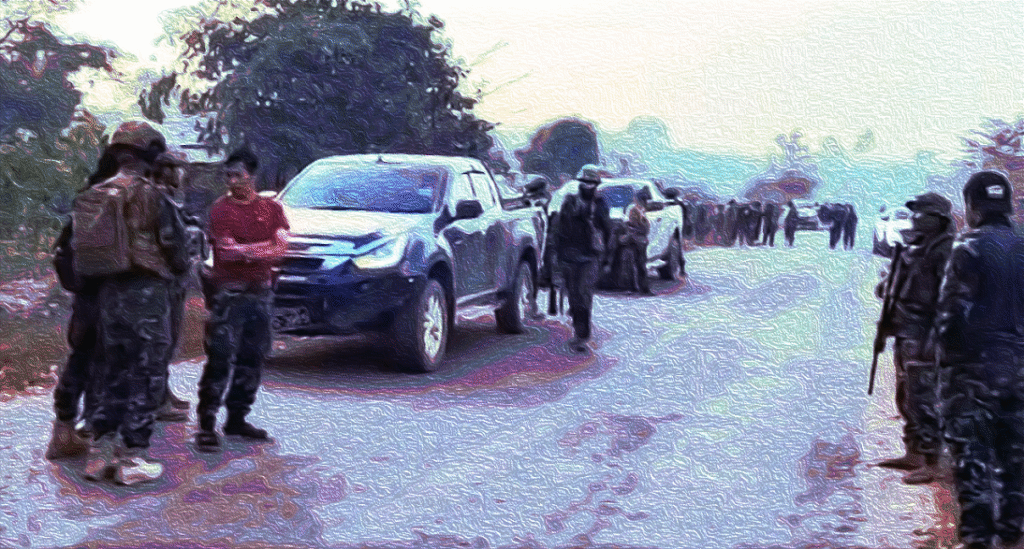Myanmar Spring Chronicle – July 16 Viewpoint
(Moemaka, July 17, 2025)
Transitional Problems During the Revolution
After the military coup in February 2021, a mass uprising emerged under the banner of resisting the coup and establishing a federal democratic state—widely known as the Spring Revolution. This movement, through both armed and nonviolent means, has endured for over four years, during which resistance forces have waged offensives, established militias, seized towns and military outposts, while the military regime responded with airstrikes, blockade tactics, and conscription laws.
From the onset of the armed resistance to its ultimate goal—defeating the junta militarily—this period has come to be understood as the revolutionary or transitional phase. This terminology is reflected in the usage of terms like Interim Government, Interim Education Committee, and Interim Governance Council, indicating a stage where the military regime has not yet been dismantled and a federal democracy has yet to be established.
During this transitional period, expectations of strong governance, education, health, and judicial systems cannot yet be fulfilled—people must endure hardships under unresolved, chaotic conditions.
Undefined Standards and Emerging Problems
Importantly, no official declaration or legislation has ever clearly defined what the “transitional period” entails or what standards it should uphold. As a result, no one anticipated or planned for the wide array of problems that have emerged under this label.
The term “transitional” is often used as a justification for falling short of ideal governance. While it may imply “temporary tolerance for disorder,” it also suggests an excuse for inaction or a lack of accountability.
Some use it as a shield to deflect criticism over financial misconduct, unregulated taxation, resource over-extraction, environmental degradation, or human rights abuses—claiming it is too early to expect standards.
Urgent Issues Facing the Revolution
The core transitional challenges today include:
-
Financial mismanagement
-
Unregulated taxation
-
Excessive resource extraction
-
Environmental destruction
-
Unaddressed human rights violations
These are not abstract; they are widely visible and reported daily from various territories.
It is now clear that the armed revolution cannot be completed in 6 months or even a year. After 4.5 years of resistance, no one can confidently say whether victory will come in another year or require more time.
Thus, while some imperfections in governance and justice are understandable, actions that directly undermine the revolution’s moral goals must be addressed urgently during this transitional phase.
Environmental and Economic Risks from Resource Mismanagement
The unchecked exploitation of natural resources is one of the most pressing and dangerous threats to the revolution’s legitimacy. Examples include:
-
Jade mining in Hpakant and Moguok, under ethnic armed group control
-
Rare earth mining in Wa and Kachin areas, leading to cross-border environmental damage
-
Heavy machinery gold dredging in Sagaing, Mandalay, and northern Shan, polluting rivers and water sources
-
Deforestation in protected forests in Sagaing, Kachin, and Bago, linked to locally dominant armed groups
These are not minor side effects—they risk irreversible environmental harm and long-term suffering for local communities. The claim that funding the revolution requires these activities cannot justify the permanent damage they are causing.
From Donations to Coercive Taxation
In the early phase, the revolution was funded by public donations, but as years have passed:
-
Armed groups have grown in size
-
The public’s ability to give has decreased
-
Checkpoints and arbitrary tax collection have multiplied
-
These have driven up the cost of goods, worsening the economic burden on civilians
When civilians already struggle with declining incomes, they now face inflated prices for food and basic necessities. This has become a serious social issue that the leadership must address.
Human Rights Violations by Resistance Forces
The revolution rightly denounces mass killings and war crimes by the military. However, some resistance units have also committed murder, robbery, and sexual violence.
While the military’s crimes are systematic, any abuses by the resistance—no matter how rare—must not be tolerated or excused due to the transitional phase.
Accountability must be swift and public, or else the resistance risks mirroring the very tyranny it opposes. No one involved in murder, assault, or rape should be shielded until “after the revolution succeeds.”
Final Thoughts
The term “transitional” should not become a euphemism for lawlessness or unaccountability. The revolution’s core goals—liberty, justice, and federal democracy—must be preserved, even during hardship.
Failing to address these urgent issues now would betray the revolution’s spirit and alienate the public it depends on. If the resistance movement does not clean house and uphold its ideals, it risks losing the trust and moral legitimacy it so desperately needs.

